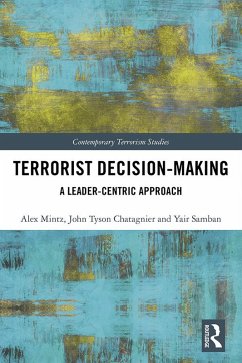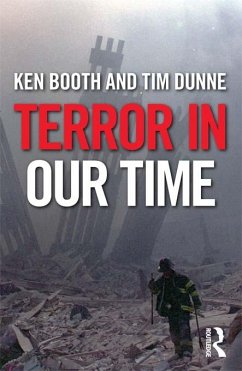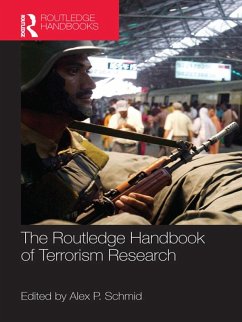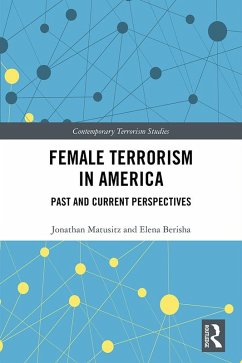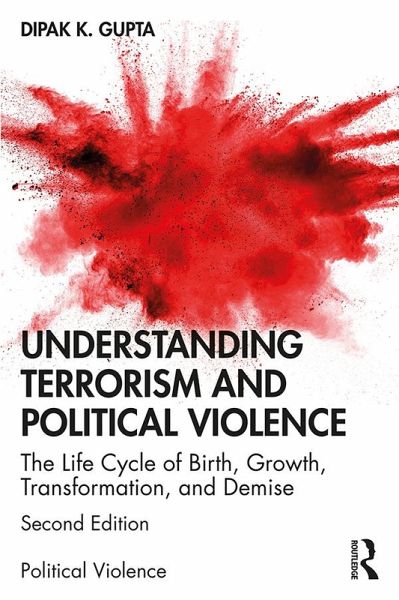
Understanding Terrorism and Political Violence (eBook, ePUB)
The Life Cycle of Birth, Growth, Transformation, and Demise
Versandkostenfrei!
Sofort per Download lieferbar
38,95 €
inkl. MwSt.
Weitere Ausgaben:

PAYBACK Punkte
19 °P sammeln!
This book provides a multidisciplinary approach to understanding human behavior and uses it to analyze the forces shaping the life cycle of violent political movements. This new edition has been revised and updated, with three new chapters added.The second edition takes us deeper inside human motivations, which cause otherwise rational people to join dissident groups, willing to kill and be killed. In doing so, the book draws upon research on brain science, evolutionary biology, and social psychology to help explain pathological collective behavior. From the motivations of individual participa...
This book provides a multidisciplinary approach to understanding human behavior and uses it to analyze the forces shaping the life cycle of violent political movements. This new edition has been revised and updated, with three new chapters added.
The second edition takes us deeper inside human motivations, which cause otherwise rational people to join dissident groups, willing to kill and be killed. In doing so, the book draws upon research on brain science, evolutionary biology, and social psychology to help explain pathological collective behavior. From the motivations of individual participants, the book turns to the evolution of terrorist groups by venturing into theories of organizational development. Together, these theories explain the life cycle - the birth, growth, transformation from an ideological group to a criminal syndicate, and demise - of a dissident organization. These hypotheses are supported with detailed case studies of three disparate terrorist movements: the nationalists of the IRA, the communist Naxalites of India, and the religious fundamentalists of al-Qaeda and ISIS.
The book's theory leads to an explanation of the current global trend of rising tribalism and authoritarianism. The author warns that this latest wave of xenophobia and authoritarianism is likely to be exacerbated by climate change and the consequent rise in sea levels, which could displace millions from the areas least able to mitigate the effects of global warming to the countries that can.
This book will be essential reading for students of terrorism studies, and of great interest to students of social psychology, political science, and sociology.
The second edition takes us deeper inside human motivations, which cause otherwise rational people to join dissident groups, willing to kill and be killed. In doing so, the book draws upon research on brain science, evolutionary biology, and social psychology to help explain pathological collective behavior. From the motivations of individual participants, the book turns to the evolution of terrorist groups by venturing into theories of organizational development. Together, these theories explain the life cycle - the birth, growth, transformation from an ideological group to a criminal syndicate, and demise - of a dissident organization. These hypotheses are supported with detailed case studies of three disparate terrorist movements: the nationalists of the IRA, the communist Naxalites of India, and the religious fundamentalists of al-Qaeda and ISIS.
The book's theory leads to an explanation of the current global trend of rising tribalism and authoritarianism. The author warns that this latest wave of xenophobia and authoritarianism is likely to be exacerbated by climate change and the consequent rise in sea levels, which could displace millions from the areas least able to mitigate the effects of global warming to the countries that can.
This book will be essential reading for students of terrorism studies, and of great interest to students of social psychology, political science, and sociology.
Dieser Download kann aus rechtlichen Gründen nur mit Rechnungsadresse in A, B, BG, CY, CZ, D, DK, EW, E, FIN, F, GR, HR, H, IRL, I, LT, L, LR, M, NL, PL, P, R, S, SLO, SK ausgeliefert werden.






